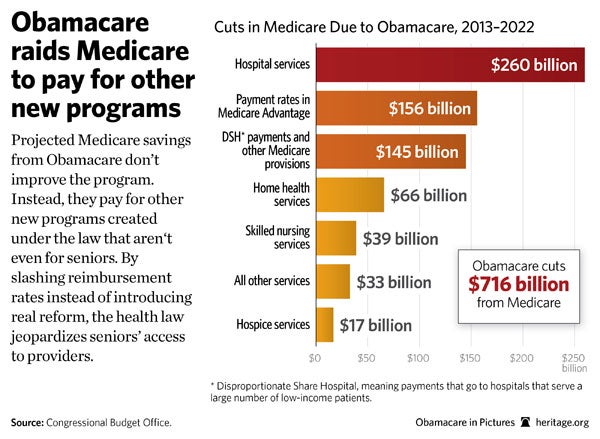Presidential Debate Prep: Understanding Obamacare’s $716 Billion in Cuts to Medicare
Robert Moffit / Alyene Senger /
As the Medicare debate intensifies, there still seems to be popular confusion regarding the $716 billion in “savings” from Obamacare’s Medicare payment cuts. Let us end the confusion.
Which Parts of Medicare Will Be Cut?
In Obamacare, the payment cuts are across-the-board cuts (modifications of Medicare’s complex payment formulas) made throughout the bulk of the Medicare program. According to the nonpartisan Congressional Budget Office (CBO), these cuts will decrease Medicare spending by an estimated $716 billion between 2013 and 2022.
The money is cut from hospital services, Medicare Advantage, skilled nursing services, hospice services, and other Medicare services. To be clear, the cuts do not target individual institutions or medical organizations suspected of waste, fraud, or abuse. (continues below chart)
Where Does the Money Go?
Despite a continuous and steady repetition of false claims by supporters of Obamacare in and out of Congress, the $716 billion in “savings” from Medicare are taken out of the program to pay for new spending in Obamacare. The cuts do not strengthen the Medicare program, nor do they extend the life of the Part A trust fund. In correspondence with Senator Jeff Sessions (R–AL), ranking member of the Senate Budget Committee, the CBO has confirmed that the majority of the savings leave Medicare to fund Obamacare and thus cannot be counted again as improving Medicare’s finances.
But Don’t Seniors Get New Drug Benefits?
Obamacare does spend some money to fill in the coverage gap in the Medicare prescription drug benefit, known as the donut hole, but this is separate from the $716 billion in cuts.
Although it is typically left out of liberal talking points, beneficiaries will share the cost burden of filling the “donut hole” with the government. According to CBO’s 2010 estimate, “enacting those changes would lead to an average increase in premiums for Part D beneficiaries of about 4 percent in 2011, rising to about 9 percent in 2019.”
As the average premiums of all Part D beneficiaries increase, keep in mind that in 2007, only 14 percent of those beneficiaries actually fell into the donut hole.
Moreover, as Forbes columnist and health policy specialist Avik Roy has pointed out, the ratio of cuts to increased benefits is 15 to 1, hardly a good deal for seniors.
Will the Cuts Affect Seniors’ Benefits?
Absolutely, without a shadow of a doubt, seniors will feel the impact of Obamacare’s cuts through decreased benefits or the inability to access health care. Heritage expert Bob Moffit has clarified, “Financing directly affects the quantity and quality of the benefits available to the beneficiaries.”
For example, the Medicare actuary projects that the cuts to Medicare Advantage ($156 billion over 10 years), the popular private alternative to traditional Medicare, where 27 percent of all beneficiaries are enrolled, will decrease enrollment by 50 percent by 2017. Millions of seniors will be forced to give up their current plans and go into traditional Medicare, where they will receive fewer benefits and pay higher out-of-pocket costs.
Further, seniors will face greater barriers when attempting to access care. The Medicare actuary projects that over the next 10 years, Medicare Part A providers (i.e., hospitals and nursing homes) may stop accepting Medicare patients or 15 percent of them will become unprofitable due to the severe Obamacare cuts. If Obamacare remains on the books, the number of providers becoming unprofitable will reach 40 percent by 2050. A doubling of Medicare patients with a major reduction in the number of providers will guarantee access problems for senior citizens.
Putting Obamacare’s Cuts in Context
The Medicare program today is in a desperate situation. The hospital insurance trust fund that finances Part A of Medicare is projected by the Medicare trustees to be bankrupt by 2024. Worse, over the long term, the Administration and Congress have made $37 trillion worth of benefit promises to future seniors that they cannot keep—there simply won’t be funding for them. Despite these enormous issues, Obamacare cuts the program instead of reforming it to last for future generations.
During tonight’s debate, remember that financing Medicare benefits and seniors’ ability to access those benefits are distinctly correlated. You can’t get something for nothing or a lot for a little. Not on planet Earth.

